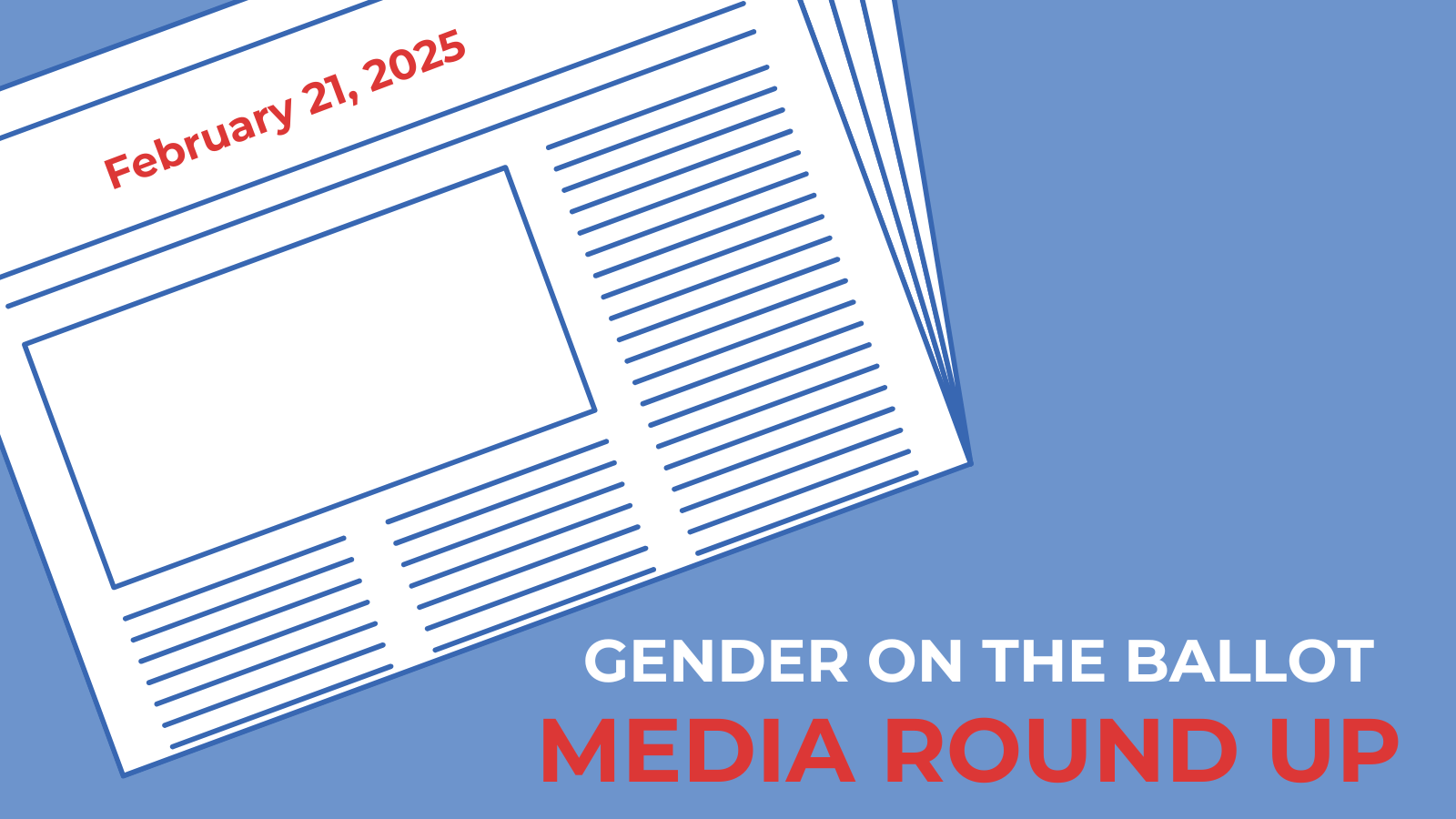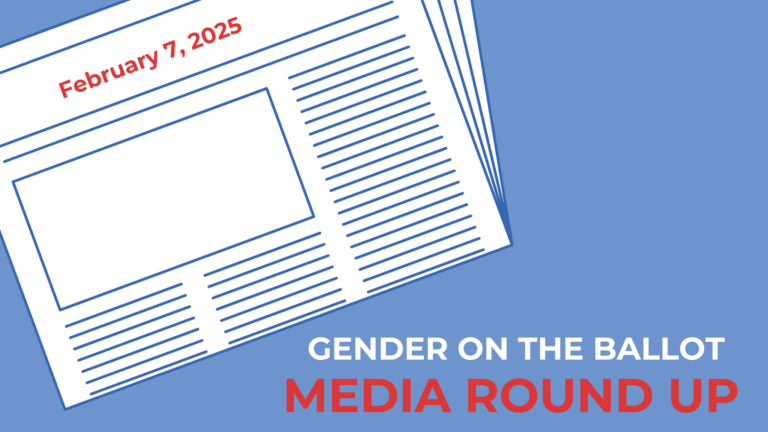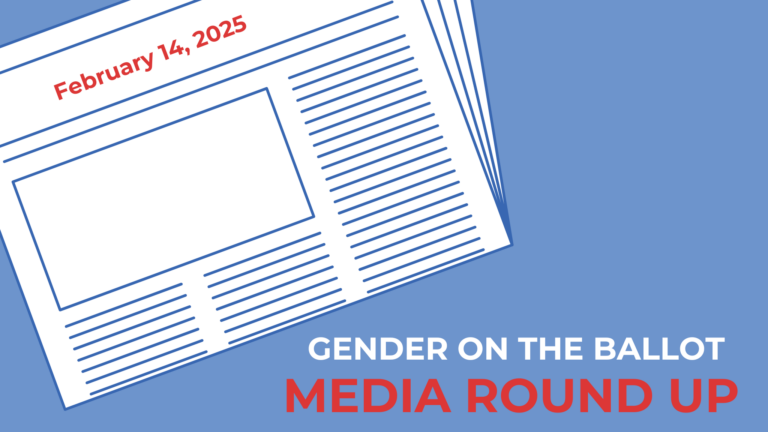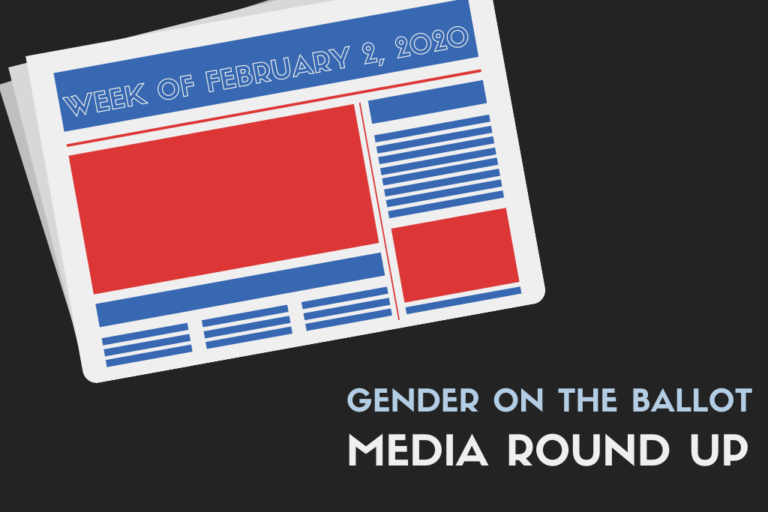Happy Friday! Welcome to the Media Round Up. Each week we’re collecting and sharing our…
Weekly Media Round Up: February 21, 2025

Happy Friday! Welcome to the Media Round Up. Each week we’re collecting and sharing our favorite gender + politics stories.
Hitting a paywall? Some sources allow a few free articles without a subscription, and your university or local library may offer free access. For example, AU students, faculty, and staff have access to popular newspapers through the library. Click here to learn more.
Senate Confirms Kelly Loeffler, Former Georgia Senator, To Lead Small Business Administration
AP, Meg Kinnard
Kelly Loeffler (R) was confirmed by the Senate on Wednesday to lead the Small Business Administration. The vote was 52-46. She will oversee the agency that provides relief and support to small businesses across the country. Loeffler briefly represented Georgia in the Senate after filling a vacancy in 2020, but would lose a special runoff election in 2021. After her loss, Loeffler created a conservative voter registration organization and became one of the top donors for Trump’s 2024 campaign. She also co-chaired Trump’s second inaugural committee.
Senate Republicans Slow-Walk Elise Stefanik’s Confirmation to Be U.N. Ambassador
NBC News, Melanie Zanona, Frank Thorp V and Garrett Haake
Representative Elise Stefanik (R-NY) is facing a slow confirmation to be the U.N. Ambassador that is largely believed to be caused by the White House. If Stefanik is confirmed, the Republican majority in the House of Representatives will be very slim, with Republicans outnumbering Democrats by just two members with a 217-215 makeup. Republican Congress leadership is supportive of Stefanik’s confirmation but taking cues from the White House on when to confirm her to avoid chaos in the House. Stefanik has served in the House since 2015 and is Chair of the House Republican Conference.
Incumbent Wisconsin Schools Leader and GOP-Backed Challenger Advance in Primary
AP, Scott Bauer
Two female candidates are in a close race to lead the Wisconsin Department of Public Instruction. Jill Underly (D) currently leads the state-wide school administration after winning in 2021. She describes herself as a champion for public schools. Brittany Kinser (R) is an education consultant and supporter of public charter schools and Wisconsin’s private school voucher program. Both women have received substantial donations from their respective party organizations. Wisconsin does not have a state-wide board of education. The Department of Public Instruction oversees the state’s education policy, teacher managing, and allocation of funds. The election is April 1.
Women in the Workplace: Hope and Pitfalls
A new report in the United Kingdom showed that women effectively worked seven weeks for free this past year compared to men. Trades Union Congress (TUC), a top trade union organization in the U.K., says the 13.1% wage gap means women worked for free through Sunday, February 16th. Women tend to work in lower paying jobs and more part-time positions whilst caring for their families, which the TUC says explains the wage gap. For women aged 40-49, their gap is 16.5%, and for women aged 50-59, it is almost 18%. In the United States, federal workers are facing mass firings, including Helen Dhue, who was fired while flying home from a work trip. Dhue worked as a park guide for the Palo Alto Battlefield National Historical Park, and like many of those fired, was a recent hire and still in her probationary period. She is just one of 1,000 National Park Service employees in jeopardy after the Trump administration’s massive federal workforce cuts. On the East coast, Ginny Thomas, a photographer based in Silver Spring, MD, offered free headshots to any federal employee due to the emotional turmoil of the federal job cuts. She played upbeat music and offered community to workers who are either fired or about to be fired and facing great uncertainty. Thomas says her heart is “bleeding” for workers and she “has to help.”
Access to Reproductive Health Care
Since the Supreme Court’s 2022 overturning of Roe v. Wade, many have speculated how an incoming Trump administration would handle women’s access to reproductive health care. One month into his second presidency, some answers have started to become clear: Trump’s withdrawal of USAID funding is having an “immediate impact” for women in poor countries, denying nearly one million women a week access to contraception. Women in regions reliant on USAID funding have received access to contraception, HIV and tuberculosis treatment, and family planning; without these funds, the consequences could be “manifold.” In the U.S., new legislation introduced in Missouri would create a list of “at risk” pregnant women in order to “reduce the number of preventable abortions.” If passed, Missouri would create a registry of every pregnant woman in the state “who is at risk for seeking an abortion; the bill would also mandate the “safe and healthy birth of children in the state.” Access to abortion in the state is actually starting to open up again after voters approved a constitutional amendment to end some of the “strictest abortion bans in the country.”
Women Are Hurting After Four Years of Biden – Congress Must Not Let Trump’s 2017 Tax Cuts Expire
The Hill, Carrie Sheffield
An opinion piece for The Hill contends that women stand a “lot to lose” if key provisions of the Tax Cuts and Jobs Act of 2017 are not restored and reformed. Under the 2017 tax reform, the article argues, women experienced “record high incomes,” single women saw their guaranteed personal tax deduction rise by $15,300, and mothers were eligible for a $2,000 per child tax credit. If the bill expires, a family of four making the median income in the U.S. could see a tax increase, child tax credits for mothers could decrease, and women running small businesses could “face greater headwinds” to absorb higher tax rates. Congressional leaders have indicated that they are committed to renewing provisions of the bill, which is “good news” for women who “deserve to keep more of their hard-earned money and increase our economic security for retirement and building families.”
Women’s Status in Flux
Across the world, women’s status always seems to be in flux – while one region of the world is experiencing a loss of women’s rights, another can be flourishing under women’s leadership.
In the United States, President Donald Trump’s executive orders attacking “gender ideology” and DEI programs have led to the word “women” being erased across federal government websites and research. NASA has been scrubbing terms related to women in leadership from public websites in an effort to comply with Trump, while the CDC has removed a number of webpages related to gender; the NSF has compiled a list of “hot-button words” (such as “women,” “gender,” and “minority”) that they are cross-referencing against research projects, and the NIH and other research departments are conducting a “similar dystopian exercise.” While women in the U.S. are seemingly being erased, in another part of the world, a network of women has created agency and self-governance in a historic struggle against violence: in Rojava, a northeast region of Syria once entangled in the Syrian civil war, the Democratic Autonomous Administration of North and East Syria has a claim to being “the most equal political structure in the world.” The administration governs based on “strictly equal” power-sharing structures between men and women, enabling women to lead committees, councils, and neighborhoods.






